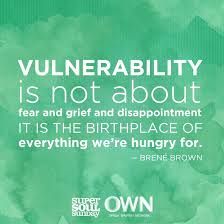
The Courage to be Vulnerable
No one likes feeling vulnerable. Brene’ Brown, author of Daring Greatly, said she can’t tell you how many people have said to her, “I don’t do vulnerability,” usually followed by a professional or gender qualifier. “I’m an engineer – we hate vulnerability.” “I’m a lawyer – we eat vulnerability for breakfast.” “Guys don’t do that vulnerability thing.” Frankly, there are plenty of women who feel the same way.
While we’ve all resisted being vulnerable at different times in our lives, hopefully we’ve all also learned that there are no real connections with other people without it. Honest and appropriate vulnerability can create trust, accountability, reciprocal sharing, solidarity and relationship.
I have tried in my sermons to be open enough to share my mistakes, my failings, my growing edges in the hopes that you won’t “eat me for breakfast” but will relate instead. Every once in a while, I have a vulnerability hangover where afterwards I wonder if I said too much, but I’m mostly past the point of feeling shame or embarrassment for stuff I’ve done and I’m chalking it up to experience and growth and can only hope now that others can learn from those things, too.
Brene’ Brown defines vulnerability as, “uncertainty, risk, and emotional exposure.” Every Sunday I risk vulnerability when I preach. I’m uncertain as to how people will respond, I risk not being liked or understood, and sometimes I experience emotional exposure when I share personal stories.
Vulnerability is so many, many things: being authentic, sharing your gifts, falling in love, saying “I’m sorry,” forgiving someone, going to the doctor or dentist, asking for help, trying something new, losing a job, coming out, sharing your art, music, poetry, or cooking, getting married, getting divorced, losing a loved one, telling someone they hurt you. The list goes on and on
Sometimes people mistakenly think that being vulnerable means being weak. None of these things just named showed weakness, they showed courage and strength. It takes bravery to deal with uncertainty, risk and emotional exposure because being vulnerable can be scary and uncomfortable. It will be our choice to decide if we will run, hide, lash out or stick it out and go for it when we feel vulnerable.
As Brene’ Brown wrote, “Vulnerability is the birthplace of love, belonging, joy, courage, empathy, and creativity. It is the source of hope, empathy, accountability, and authenticity. If we want greater clarity in our purpose or deeper and more meaningful spiritual lives, vulnerability is the path.”
Vulnerability is at the core of everything that is important and meaningful. Whether that is following your dreams, finding love, having friends, or following a spiritual path. I’m not sure I can think of anything worthwhile that doesn’t require vulnerability.
Looking to scripture for a passage or a story to illustrate vulnerability I realized that there is vulnerability in every story. Think about these few:
- Woman caught in the act of adultery
- Joseph’s brothers who asked for his forgiveness
- The many people who asked Jesus for help
- The woman who anointed Jesus’ feet
- Mary who dared to sit at Jesus’ feet to learn
- Jesus coming into Jerusalem on a donkey
- Jesus asking his disciples to sit with him in the garden of Gethsemane
- Jesus before Pilate
Each and every person in these stories was vulnerable to being hurt, to being rejected. Most everyone had something to gain as well: healing, forgiveness, acceptance, integrity, knowledge, hope, support.
In 2 Corinthians 6:11-13 Paul clearly felt it was crucial, in his quest to expand the Jesus movement, to do so by being completely open and vulnerable to create a trusting, deeply intimate relationship with people so they could share and grow on a spiritual level. Listen to the vulnerability in this passage:
We have spoken frankly to you, Corinthians; we’ve opened our hearts wide to you. We’re not holding anything back; you, on the other hand, are holding back your affection from us. It would be a fair exchange – I speak as to my children – if you’d open your hearts as widely to us as we do to you.
This week four of us from Sacred Journeys went to see the Rev. Dr. Otis Moss III speak at the Siena Center. During the question-and-answer session some of the conversation focused on retributive vs. restorative justice. There were two women who worked with at risk kids in our community and they shared a small taste of their sadness, their exhaustion, their struggles (which they didn’t have to do), and asked for a word a hope, a booster shot of strength and resilience to keep doing the hard thing. Rev. Moss offered some encouraging words of strength and gratitude, which I hope were helpful. However, I also hope they found strength and support in the connections I saw being made afterwards. There were many, many people who approached them, thanked them for their work, said they would pray for them, or held conversations for a little bit. None of that happens without vulnerability.
I am not asking you to indiscriminately spill your guts to every available person. I am not asking you to recklessly take risks. But I’m encouraging you to look at your life and recognize how much of your own growth – personally, professionally, relationally, spiritually, could only have taken place by allowing yourself to be vulnerable.
One last thought, the opposite of vulnerability isn’t security. As Helen Keller once said, “Security is mostly a superstition. It does not exist in nature, nor do children as a whole experience it. Avoiding danger is not safer in the long run than outright exposure. Life is either a daring adventure or nothing.”
Love & Light!
Kaye



